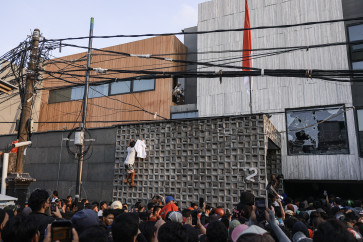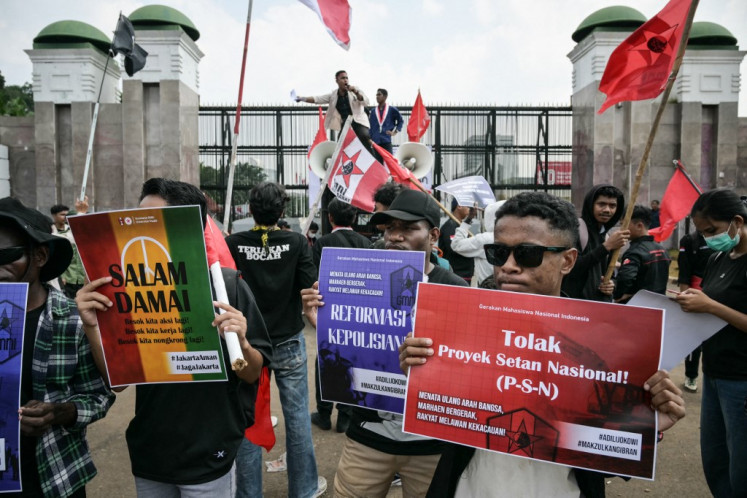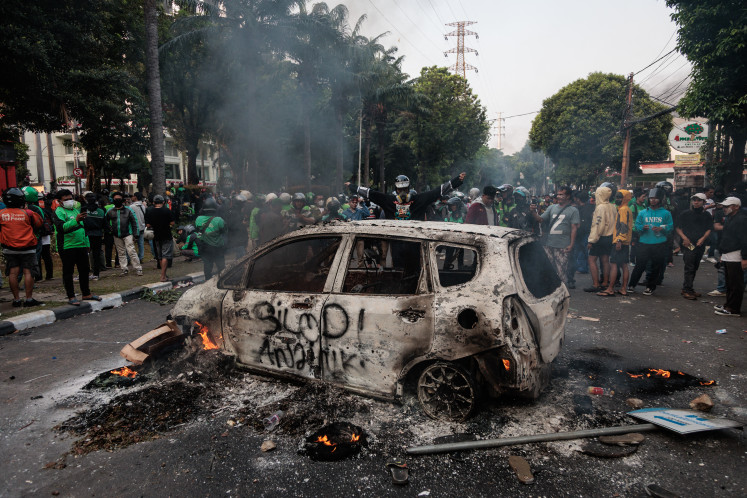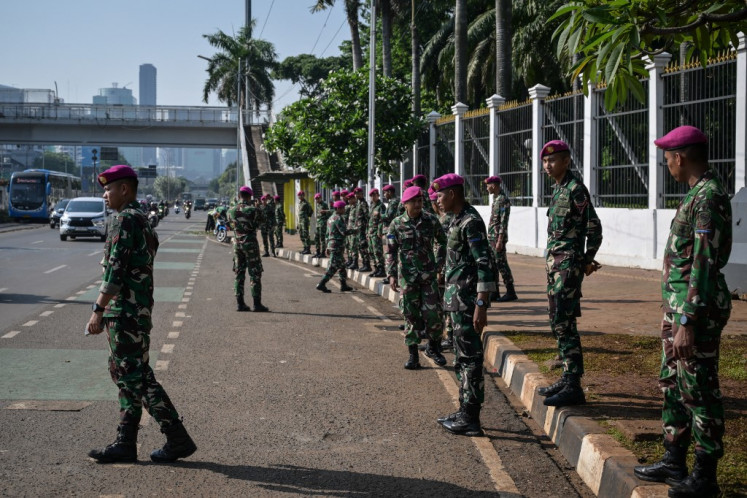Popular Reads
Top Results
Can't find what you're looking for?
View all search resultsPopular Reads
Top Results
Can't find what you're looking for?
View all search resultsAtypically American, inspiringly Indonesian
Fragments about Ann Dunham, mother of President Barack Obama, appeared in Obama’s autobiography Dreams from My Father and later during his 2008 presidential campaign
Change text size
Gift Premium Articles
to Anyone
F
ragments about Ann Dunham, mother of President Barack Obama, appeared in Obama’s autobiography Dreams from My Father and later during his 2008 presidential campaign.
In the autobiography, Dunham was the cerebral University of Hawai’i freshman from Kansas who fell in love with the charismatic and opinionated student from Kenya, Barack Obama, Sr., and later went to study and live among Indonesians.
Vignettes about Dunham’s brush with the indignities that sometimes dovetail a downtrodden life in America — receiving food stamps, pleading with an uncaring healthcare system — helped frame a compelling vision of why change, Obama’s campaign catchword, was something Americans should believe in (and vote for). But her story was never just about Ann Dunham.
That is unfortunate because Dunham’s life makes for a great story and an inspiring gem for Indonesians who also work for the uplift of their country.
In her biography A Singular Woman: The Untold Story of Barack Obama’s Mother, Janny Scott has happily saved Dunham’s life story from obscurity and distortion.
Despite the fragmentary images and supporting role in Dreams from My Father, Dunham emerges from Scott’s narration an acute, atypical and audacious American who is partial to honest deliberativeness and believes in fundamental human goodness despite cosmetic differences — qualities that are also remarkably evident in her son.
Dunham was a woman who, in Scott’s words, “grew up in the years before the women’s movement, the pill, and the anti[-Vietnam War] movement; who married an African at a time when nearly two dozen [US] states still had laws against interracial marriage; who, at 24, moved to Jakarta with her son in the waning days of an anticommunist bloodbath … who, as a working and mostly single mother, brought up two biracial children; who believed her son in particular had the potential to be great … and then died at 52, never knowing who or what he would become”.
For Indonesians in particular, Dunham should be a figure much more consequential, and thus worthier to read about, than her son. While it is nice that Obama spent a sizeable part of his childhood in Indonesia, Dunham contributed to the improvement of welfare for those disadvantaged Indonesians she affected through her work as an anthropologist and later in microfinance and development consulting.
After a peripatetic childhood that included spells in Kansas, Oklahoma, Texas, California and the outskirts of Seattle, Stanley Ann Dunham, the meticulously researched A Singular Woman establishes, shed her masculine first name at 17 when she went to college in Hawaii in 1960. By the time Obama was born in 1961, Dunham’s marriage to Obama, Sr. was ending.
Among the first Indonesian students sent to the East-West Center, an education and research organization established in Honolulu to bridge America and the Asia Pacific, Lolo Soetoro met Dunham in 1962 — after Obama, Sr. had left for Harvard — and married her in 1964.
The failed coup of 1965 in Indonesia prompted the recall of government-sponsored Indonesian students abroad, including Soetoro. Once Dunham graduated with a degree in anthropology in 1967, she and six-year-old Obama joined Soetoro in Indonesia.
Although Soetoro’s move from the army to working for an American oil company improved the family’s finances in the early 1970s, Dunham and Soetoro began to drift apart. Already “a bit sturdy for a woman” by Javanese standards, Dunham was not one to don a kain kebaya, one of Indonesia’s form-fitting traditional female costumes, at social gatherings for oilmen.
Confronted with Soetoro’s irritation that Dunham would not appear by his side at these gatherings with “her own people”, Obama reminisces in his Dreams from My Father, Dunham retorted, “They are not my people.”
A cliché in Obama-lore by now: As Soetoro was increasingly Americanized, Dunham became more Javanese. That would have held Dunham in good stead as she leapt into her doctoral field research, with funding from the East-West Center, focusing on blacksmithing in the hamlets of Kajar in Central Java, and later development work throughout Indonesia.
Her work on social and economic development in Indonesia led her to conclude in her dissertation, which was published in 2009 as Surviving the Odds: Village Industry in Indonesia, that “entrepreneurial attitudes are a part of the traditional culture” and that a problem that is stalling development in rural Indonesia is access to capital.
Scott’s sympathetic exploration of the high premium Dunham put on education, and how the pursuit of education would aggravate the existing tensions with her son, is most compelling. Coming from a long lineage of forebears who attended college and went to graduate school, Dunham strove to prioritize education for herself and her children at whatever cost. Her quest for education — Dunham did not obtain her Ph.D. until 1992 — and providing for her children meant that distance, in both time and space, from her children must have become an increasing burden. Indeed, her wrenching decision to send Obama back to the United States for his secondary education onward while she finished her field research led to Dunham’s increasing wistfulness about that growing distance from her son. Obama thought so, too.
“But being a parent now and looking back at that, I could see — you know what? — that would be hard on a kid.”
However, for a journalist who received the Pulitzer Prize in 2001 for “How Race Is Lived in America”, a 15-part series of articles examining racial experiences and attitudes, Scott disappointingly does not look deeply enough into the casual racism that continues to prevail in Indonesia or Dunham’s reaction to Obama’s experiences of racism.
In her A Singular Woman, Scott does recount at least two instances of racism directed at Obama experienced in Indonesia. The first describes how some Indonesian children began lobbing rocks in Obama’s direction for being, presumably, black; Dunham’s response to this evidence of racism was stoic insistence that Obama be fearless.
A friend of Dunham said, “We were floored that she’d bring a half-black child to Indonesia, knowing the disrespect [Indonesians] have for blacks.” The second instance referred to a former colleague of Dunham who admitted to making “a joke of [Obama] because he looked different —the color of his skin.” “Joked with him — or about him?” Scott continued. “With and about him,” the colleague said, with no evident embarrassment.
During a tense moment between Dunham and a teenager Obama recounted in A Singular Woman, Dunham said to Obama, “If nothing else, I gave you an interesting life.” Indeed, what an interesting life Dunham led! What a readable account of that life is A Singular Woman!
Ray Hervandi works on Southeast Asian affairs at the East-West Center in Washington, D.C.
A Singular Woman: The Untold Story of Barack Obama’s Mother
Author: Janny Scott
Publisher: Riverhead
Pages: 376 pages
Price: US$26.95










